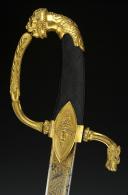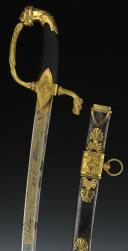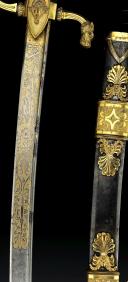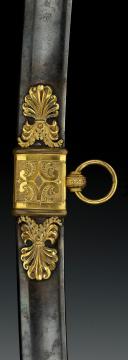
Luxury sword that belonged to François Marie Joseph Riou de Kersalaün, Major of the National Guard of Brest, President of the National Assembly, French Revolution, Consulate.
Sold out
Luxury sword that belonged to François Marie Joseph Riou de Kersalaün, Major of the National Guard of Brest, President of the National Assembly, French Revolution, Consulate.
Chiselled and golden bronze knuckle bow, same pattern as the swords that were given by the First Consul after the battle of Marengo, langets decorated with the head of Minerva seen from the front; the knuckle bow is entirely chiseled with foliage, wolf-head shaped quillon, lion-headed pommel top, squared ebony grip. Damaskus steel blade, one-third gilded, etching engraved with trophies and monogram RK (Riou de Kersalaün), back signed: Manufacture de Klingenthal Coulaux Frères. Steel blue scabbard with three pieces of gilded bronze trimming and palm leaf shaped decorations; the scabbard ends up in an openwork design; bronze, double-scrolled drag. Length: 113 cm.
Former Georges Schweitzer collection (Strasbourg); illustrated in the catalogue of the military exhibition of the Society of Arts' Friends, Strasbourg, 1904, plate IX, number 2, entitled “Sword of Honour”, registered as number 693 in the short general catalogue.
François Marie Joseph Riou de Kersalaün.
He was born on 2nd May 1765 in Morlaix (Finistère- France).
He died on 25th July, 1811 in Paris (Paris- France).
He was Deputy at the Council of Five Hundred. He was the son of a merchant navy captain. He studied in Saint-Pol-de-Léon. He worked as a lawyer in Limoges, then in Lorient, and was called to the bar in his native town. He was inspector of his town's deeds, and he attended the new town council of Saint-Pol-de-Léon, when he decided to claim full power for himself and to pass the martial law. He was First Lieutenant of the First Grenadier Regiment of the national militia, then he was major of the National Guard, and he became Brest local officer and acting mayor. On 25th Vendémiaire (first month of French Republican calendar), year IV, he was elected Deputy of the Finistère for the Council of Five Hundred, by 100 voters out of 270; his election was threatened with being declared void because some of his relatives were émigrés. In Versailles, he signed jointly a declaration of Breton deputies at the States General. After some discussion, he was let in, and was a member of the finance committee; he was the rapporteur of mortgage laws; he delivered several speeches on the financial state, the banknotes used during the French Revolution, the state of the national property that remained unsold. He became President of the Assembly on 20th January 1797. He demanded that the French Directory fought against royalist plotters. He accused General Magallon and vice-admiral de Sercey of being hostile to Republican institutions. He stood up for tobacco taxes. He presented a project in favour of races. He was reelected in the same Council by the same departement on 23 Germinal, year VII. He was in favour of 18 Brumaire, and became Prefect of Cantal on 11 Ventôse, year VIII (from 1800 to 1810). He put down harsh tentative rebellions against the Republican power, especially by arresting and killing Benjamin de Pélamourgues, a gentleman who asked for his possessions to be handed over to him. He was a member of the Legion of Honour on 25 Prairial, year XII; he was appointed Baron of the Empire on 14th February 1810. He was called to other duties on 10th August 1810. He was not replaced and died within a year. He wrote: Lucretia (a tragedy) (1793); Chouans (a play) (1795); Birth of the King of Rome (odes) (1811).
He wrote several reports, among others: Report written by Riou on the petitions of Jews of Metz and Avignon for a special commission, Paris 1797; an essay entitled Opinion on the actual sense of the 12 Brumaire law on the civil status of children born out of wedlock, printed in Aurillac.
Riou de Kersalaün was once the name of the Riou de Kerprigent family.
His widow lived in the castle of La Rodde in Lacapelle-del-Fraisse.
Bibliography.
Debate between two great men, M. J. B. de Chénier and F. M. J. Riou de Kersalaun.
Report on the misappropriation of funds of the former Prefect of Cantal as regards military recruiting carried out by M. Guitard, knight of the Imperial Order, under the former Prefect of the departement (the Baron de La Chanède?); written at the hearing of the magistrates' court (dealing with criminal matters) in Aurillac, on 18th May, 1812. In Aurillac, J.L. Viallanes's printing house, 1812, in-folio of 17 pages. Biography taken from the 1789-1889 French Deputies' dictionary (A.Robert et G.Cougny).
Very good condition, steel blue of scabbard restored.
Chiselled and golden bronze knuckle bow, same pattern as the swords that were given by the First Consul after the battle of Marengo, langets decorated with the head of Minerva seen from the front; the knuckle bow is entirely chiseled with foliage, wolf-head shaped quillon, lion-headed pommel top, squared ebony grip. Damaskus steel blade, one-third gilded, etching engraved with trophies and monogram RK (Riou de Kersalaün), back signed: Manufacture de Klingenthal Coulaux Frères. Steel blue scabbard with three pieces of gilded bronze trimming and palm leaf shaped decorations; the scabbard ends up in an openwork design; bronze, double-scrolled drag. Length: 113 cm.
Former Georges Schweitzer collection (Strasbourg); illustrated in the catalogue of the military exhibition of the Society of Arts' Friends, Strasbourg, 1904, plate IX, number 2, entitled “Sword of Honour”, registered as number 693 in the short general catalogue.
François Marie Joseph Riou de Kersalaün.
He was born on 2nd May 1765 in Morlaix (Finistère- France).
He died on 25th July, 1811 in Paris (Paris- France).
He was Deputy at the Council of Five Hundred. He was the son of a merchant navy captain. He studied in Saint-Pol-de-Léon. He worked as a lawyer in Limoges, then in Lorient, and was called to the bar in his native town. He was inspector of his town's deeds, and he attended the new town council of Saint-Pol-de-Léon, when he decided to claim full power for himself and to pass the martial law. He was First Lieutenant of the First Grenadier Regiment of the national militia, then he was major of the National Guard, and he became Brest local officer and acting mayor. On 25th Vendémiaire (first month of French Republican calendar), year IV, he was elected Deputy of the Finistère for the Council of Five Hundred, by 100 voters out of 270; his election was threatened with being declared void because some of his relatives were émigrés. In Versailles, he signed jointly a declaration of Breton deputies at the States General. After some discussion, he was let in, and was a member of the finance committee; he was the rapporteur of mortgage laws; he delivered several speeches on the financial state, the banknotes used during the French Revolution, the state of the national property that remained unsold. He became President of the Assembly on 20th January 1797. He demanded that the French Directory fought against royalist plotters. He accused General Magallon and vice-admiral de Sercey of being hostile to Republican institutions. He stood up for tobacco taxes. He presented a project in favour of races. He was reelected in the same Council by the same departement on 23 Germinal, year VII. He was in favour of 18 Brumaire, and became Prefect of Cantal on 11 Ventôse, year VIII (from 1800 to 1810). He put down harsh tentative rebellions against the Republican power, especially by arresting and killing Benjamin de Pélamourgues, a gentleman who asked for his possessions to be handed over to him. He was a member of the Legion of Honour on 25 Prairial, year XII; he was appointed Baron of the Empire on 14th February 1810. He was called to other duties on 10th August 1810. He was not replaced and died within a year. He wrote: Lucretia (a tragedy) (1793); Chouans (a play) (1795); Birth of the King of Rome (odes) (1811).
He wrote several reports, among others: Report written by Riou on the petitions of Jews of Metz and Avignon for a special commission, Paris 1797; an essay entitled Opinion on the actual sense of the 12 Brumaire law on the civil status of children born out of wedlock, printed in Aurillac.
Riou de Kersalaün was once the name of the Riou de Kerprigent family.
His widow lived in the castle of La Rodde in Lacapelle-del-Fraisse.
Bibliography.
Debate between two great men, M. J. B. de Chénier and F. M. J. Riou de Kersalaun.
Report on the misappropriation of funds of the former Prefect of Cantal as regards military recruiting carried out by M. Guitard, knight of the Imperial Order, under the former Prefect of the departement (the Baron de La Chanède?); written at the hearing of the magistrates' court (dealing with criminal matters) in Aurillac, on 18th May, 1812. In Aurillac, J.L. Viallanes's printing house, 1812, in-folio of 17 pages. Biography taken from the 1789-1889 French Deputies' dictionary (A.Robert et G.Cougny).
Very good condition, steel blue of scabbard restored.
Reference :
RK0001
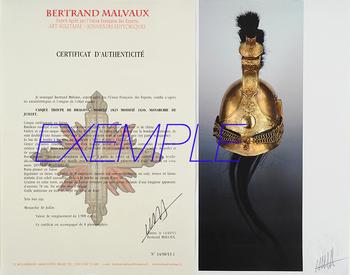
Next update Friday, april 4th at 1:30 PM
FOR ALL PURCHASES, PAYMENT IN MULTIPLE CHECKS POSSIBLE
bertrand.malvaux@wanadoo.fr 06 07 75 74 63
An authenticity certificate of the item including the description published on the site, the period, the sale price, accompanied by one or more color photographs is automatically provided for any item priced over 130 euros. Below this price, each certificate is charged 5 euros.
Only items sold by me are subject to an authenticity certificate, I do not provide any expert reports for items sold by third parties (colleagues or collectors).
